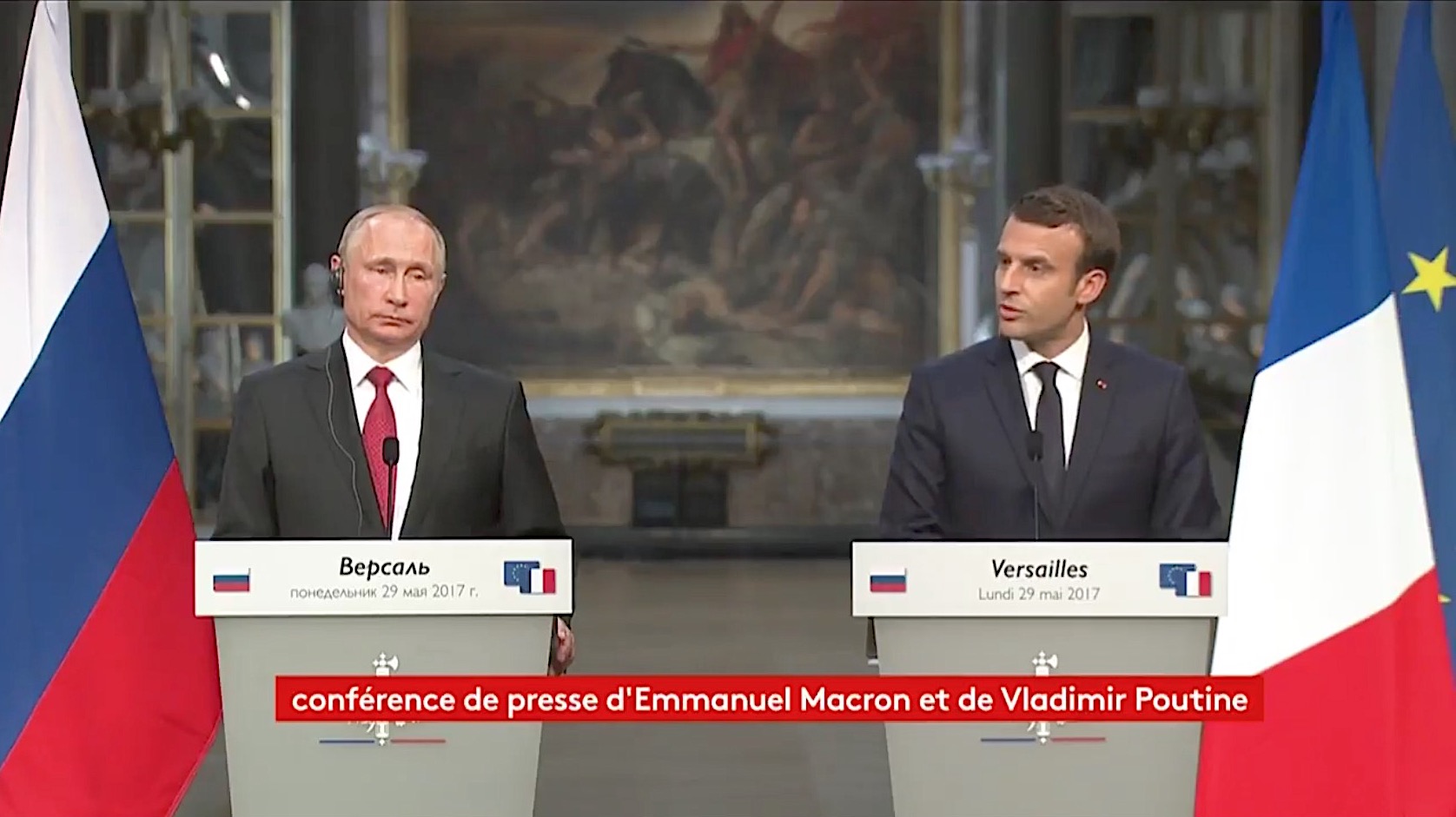France's Macron, standing beside Putin, calls Russia-funded news sites RT, Sputnik 'deceitful propaganda'


A free daily email with the biggest news stories of the day – and the best features from TheWeek.com
You are now subscribed
Your newsletter sign-up was successful
New French President Emmanuel Macron hosted Russian President Vladimir Putin in Paris on Monday, and the two leaders agreed on the need to work together to try to resolve conflicts in Ukraine and Syria. But they disagreed on the independence and integrity of state-sponsored Russian news outlets RT and Sputnik, which Macron had refused to accredit during his presidential campaign, accusing them of spreading Russian misinformation favoring his pro-Russia rival, Marine Le Pen. On Monday, Putin said Russia did not try to meddle in the French election and argued it would have been strange to not meet with Le Pen.
Standing next to Putin, Macron disagreed about the first part. RT and Sputnik "didn't act like the media, like journalists. They behaved like deceitful propaganda" and "agents of influence," he said, in response to a question from RT France head Xenia Fedorova. "I have always had an exemplary relationship with foreign journalists, but they have to be real journalists," he added. "All foreign journalists, including Russian journalists, had access to my campaign." You don't have to speak French to tell when he's talking about RT and Sputnik, or to catch Putin's expression when the translation reaches his earpiece.
Macron, 39 and in office less than a month, met with President Trump for the first time last week, and their interactions suggest his extraordinary critique of Russian media in front of Putin wasn't impromptu. On Sunday, Macron told the French newspaper Journal du Dimanche that his white-knuckled handshake with Trump "wasn't innocent." It wasn't "the be-all and the end-all of a policy, but it was a moment of truth," he added, putting Trump in the same category as Putin and Turkish President Recep Tayyip Erdogan.
The Week
Escape your echo chamber. Get the facts behind the news, plus analysis from multiple perspectives.

Sign up for The Week's Free Newsletters
From our morning news briefing to a weekly Good News Newsletter, get the best of The Week delivered directly to your inbox.
From our morning news briefing to a weekly Good News Newsletter, get the best of The Week delivered directly to your inbox.
"Donald Trump, the Turkish president, or the Russian president see relationships in terms of a balance of power," Macron said, according to The Guardian's translation. "That doesn't bother me. I don't believe in diplomacy by public abuse, but in my bilateral dialogues I won't let anything pass. ... That's how you ensure you are respected. You have to show you won't make small concessions — not even symbolic ones."
A free daily email with the biggest news stories of the day – and the best features from TheWeek.com
Peter has worked as a news and culture writer and editor at The Week since the site's launch in 2008. He covers politics, world affairs, religion and cultural currents. His journalism career began as a copy editor at a financial newswire and has included editorial positions at The New York Times Magazine, Facts on File, and Oregon State University.
-
 Political cartoons for February 20
Political cartoons for February 20Cartoons Friday’s political cartoons include just the ice, winter games, and more
-
 Sepsis ‘breakthrough’: the world’s first targeted treatment?
Sepsis ‘breakthrough’: the world’s first targeted treatment?The Explainer New drug could reverse effects of sepsis, rather than trying to treat infection with antibiotics
-
 James Van Der Beek obituary: fresh-faced Dawson’s Creek star
James Van Der Beek obituary: fresh-faced Dawson’s Creek starIn The Spotlight Van Der Beek fronted one of the most successful teen dramas of the 90s – but his Dawson fame proved a double-edged sword
-
 NIH director Bhattacharya tapped as acting CDC head
NIH director Bhattacharya tapped as acting CDC headSpeed Read Jay Bhattacharya, a critic of the CDC’s Covid-19 response, will now lead the Centers for Disease Control and Prevention
-
 Witkoff and Kushner tackle Ukraine, Iran in Geneva
Witkoff and Kushner tackle Ukraine, Iran in GenevaSpeed Read Steve Witkoff and Jared Kushner held negotiations aimed at securing a nuclear deal with Iran and an end to Russia’s war in Ukraine
-
 Pentagon spokesperson forced out as DHS’s resigns
Pentagon spokesperson forced out as DHS’s resignsSpeed Read Senior military adviser Col. David Butler was fired by Pete Hegseth and Homeland Security spokesperson Tricia McLaughlin is resigning
-
 Judge orders Washington slavery exhibit restored
Judge orders Washington slavery exhibit restoredSpeed Read The Trump administration took down displays about slavery at the President’s House Site in Philadelphia
-
 Hyatt chair joins growing list of Epstein files losers
Hyatt chair joins growing list of Epstein files losersSpeed Read Thomas Pritzker stepped down as executive chair of the Hyatt Hotels Corporation over his ties with Jeffrey Epstein and Ghislaine Maxwell
-
 Judge blocks Hegseth from punishing Kelly over video
Judge blocks Hegseth from punishing Kelly over videoSpeed Read Defense Secretary Pete Hegseth pushed for the senator to be demoted over a video in which he reminds military officials they should refuse illegal orders
-
 Trump’s EPA kills legal basis for federal climate policy
Trump’s EPA kills legal basis for federal climate policySpeed Read The government’s authority to regulate several planet-warming pollutants has been repealed
-
 House votes to end Trump’s Canada tariffs
House votes to end Trump’s Canada tariffsSpeed Read Six Republicans joined with Democrats to repeal the president’s tariffs
